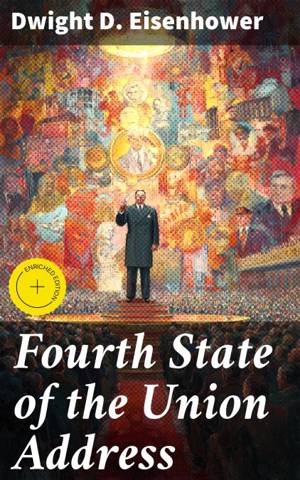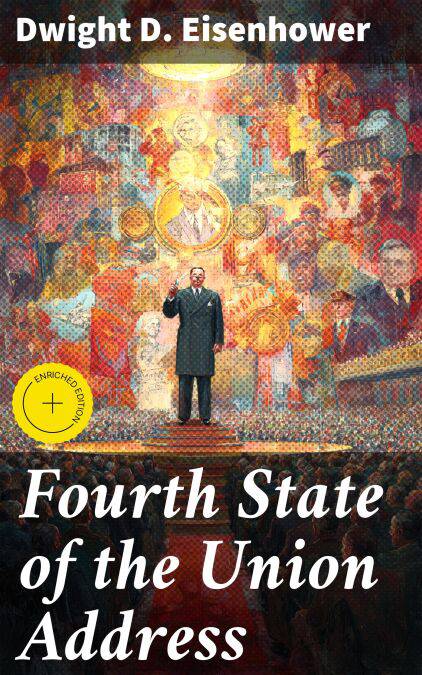
- Retrait en 2 heures
- Assortiment impressionnant
- Paiement sécurisé
- Toujours un magasin près de chez vous
- Retrait gratuit dans votre magasin Club
- 7.000.0000 titres dans notre catalogue
- Payer en toute sécurité
- Toujours un magasin près de chez vous
Fourth State of the Union Address EBOOK
Enriched edition. Shaping America: Eisenhower's Vision for the Future
Dwight D. Eisenhower
Ebook | Anglais
1,99 €
+ 1 points
Description
In his Fourth State of the Union Address, President Dwight D. Eisenhower articulates a vision for America that resonates with the principles of both democracy and pragmatism. Through a blend of rhetorical grace and incisive policy analysis, Eisenhower addresses pressing issues of the time'—ranging from the Cold War tensions and national security to economic prosperity and civil rights. This address is marked by its clarity of expression and a bid for bipartisanship during a politically charged era, reflecting the confidence and resolve of a leader navigating the complexities of modern governance. Dwight D. Eisenhower, a distinguished military leader and statesman, draws upon his extensive experience during World War II and his presidency from 1953 to 1961. His commitment to a balanced approach in both foreign and domestic policy shapes the address, as he echoes a sense of urgency while advocating for a united America. Eisenhower's own background in military strategy is expertly interwoven as he seeks to foster peace without compromising American values or interests. This State of the Union Address is essential reading for anyone interested in American political history and the evolution of presidential rhetoric. Eisenhower's eloquence and vision provide rich insights into the balancing act of leadership during a pivotal era, making this text a critical reflection on the ideals and challenges that continue to influence contemporary politics.
In this enriched edition, we have carefully created added value for your reading experience:
- A succinct Introduction situates the work's timeless appeal and themes.
- The Synopsis outlines the central plot, highlighting key developments without spoiling critical twists.
- A detailed Historical Context immerses you in the era's events and influences that shaped the writing.
- An Author Biography reveals milestones in the author's life, illuminating the personal insights behind the text.
- A thorough Analysis dissects symbols, motifs, and character arcs to unearth underlying meanings.
- Reflection questions prompt you to engage personally with the work's messages, connecting them to modern life.
- Hand‐picked Memorable Quotes shine a spotlight on moments of literary brilliance.
- Interactive footnotes clarify unusual references, historical allusions, and archaic phrases for an effortless, more informed read.
In this enriched edition, we have carefully created added value for your reading experience:
- A succinct Introduction situates the work's timeless appeal and themes.
- The Synopsis outlines the central plot, highlighting key developments without spoiling critical twists.
- A detailed Historical Context immerses you in the era's events and influences that shaped the writing.
- An Author Biography reveals milestones in the author's life, illuminating the personal insights behind the text.
- A thorough Analysis dissects symbols, motifs, and character arcs to unearth underlying meanings.
- Reflection questions prompt you to engage personally with the work's messages, connecting them to modern life.
- Hand‐picked Memorable Quotes shine a spotlight on moments of literary brilliance.
- Interactive footnotes clarify unusual references, historical allusions, and archaic phrases for an effortless, more informed read.
Spécifications
Parties prenantes
- Auteur(s) :
- Editeur:
Contenu
- Nombre de pages :
- 23
- Langue:
- Anglais
Caractéristiques
- EAN:
- 4064066437930
- Date de parution :
- 07-12-20
- Format:
- Ebook
- Protection digitale:
- Digital watermarking
- Format numérique:
- ePub

Seulement chez Librairie Club
+ 1 points sur votre carte client de Librairie Club
Les avis
Nous publions uniquement les avis qui respectent les conditions requises. Consultez nos conditions pour les avis.





